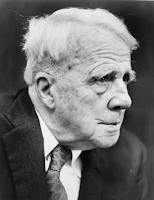To an Old Philosopher in Rome
On the threshold of heaven, the figures in the street
Become the figures of heaven, the majestic movement
Of men growing small in the distances of space,
Singing, with smaller and still smaller sound,
Unintelligible absolution and an end --
The threshold, Rome, and that more merciful Rome
Beyond, the two alike in the make of the mind.
It is as if in a human dignity
Two parallels become one, a perspective, of which
Men are part both in the inch and in the mile.
How easily the blown banners change to wings ...
Things dark on the horizons of perception,
Become accompaniments of fortune, but
Of the fortune of the spirit, beyond the eye,
Not of its sphere, and yet not far beyond,
The human end in the spirit's greatest reach,
The extreme of the known in the presence of the extreme
Of the unknown. The newsboys' muttering
Becomes another murmuring; the smell
Of medicine, a fragrantness not to be spoiled ...
The bed, the books, the chair, the moving nuns,
The candle as it evades the sight, these are
The sources of happiness in the shape of Rome,
A shape within the ancient circles of shapes,
And these beneath the shadow of a shape
In a confusion on bed and books, a portent
On the chair, a moving transparence on the nuns,
A light on the candle tearing against the wick
To join a hovering excellence, to escape
From fire and be part only of that of which
Fire is the symbol: the celestial possible.
Speak to your pillow as if it was yourself.
Be orator but with an accurate tongue
And without eloquence, O, half-asleep,
Of the pity that is the memorial of this room,
So that we feel, in this illumined large,
The veritable small, so that each of us
Beholds himself in you, and hears his voice
In yours, master and commiserable man,
Intent on your particles of nether-do,
Your dozing in the depths of wakefulness
In the warmth of your bed, at the edge of your chair, alive
Yet living in two worlds, impenitent
As to one, and, as to one, most penitent,
Impatient for the grandeur that you need
In so much misery; and yet finding it
Only in misery, the afflatus of ruin,
Profound poetry of the poor and of the dead,
As in the last drop of the deepest blood,
As it falls from the heart and lies there to be een ,
Even as the blood of an empire, it might be,
For a citizen of heaven though still of Rome.
It is poverty's speech that seeks us out the most.
It is older than the oldest speech of Rome.
This is the tragic accent of the scene.
And you -- it is you that speak it, without speech,
The loftiest syllables among loftiest things,
The one invulnerable man among
Crude captains, the naked majesty, if you like,
Of bird-nest arches and of rain-stained vaults.
The sounds drift in. The buildings are remembered.
The life of a city never lets go, nor do you
Ever want it to. It is part of the life in your room.
Its domes are the architecture of your bed.
The bells keep on repeating solemn names
In choruses and choirs of choruses,
Unwilling that mercy should be a mystery
Of silence, that any solitude of sense
Should give you more than their peculiar chords
And reverberations clinging to whisper still.
It is a kind of total grandeur at the end,
With every visible thing enlarged and yet
No more than a bed, a chair and moving nuns,
The immensest theatre, the pillared porch,
The book and candle in your ambered room.
Total grandeur of a total edifice,
Chosen by an inquisitor of structures
For himself. He stops upon this threshold,
As if the design of all his words takes form
And frame from thinking and is realized.
--Wallace Stevens
This is an inexhaustible poem, one that lends itself to readings and rereadings and yet never yields up everything within. The old philosopher of the title is George Santayana, whose last years were spent under the care of the nuns of a convent in Rome. When Stevens was a student at Harvard, he became acquainted with Santayana, who taught in the philosophy department. The usual way of explicating such a poem might be to try linking its ideas to Santayana's, but I really think Stevens is using the philosopher as a symbol of the thinking mind trying to make sense of the external world even as death is about to extinguish that mind. For me the key lines in the poem (as well as the most beautiful ones) are:
A light on the candle tearing against the wickThis is not a poem about raging against the dying of the light; it's about joining that light -- call it God, call it imagination, call it the Oversoul. Better yet, call it the celestial possible. Which is the earthly impossible.
To join a hovering excellence, to escape
From fire and be part only of that of which
Fire is the symbol: the celestial possible.



